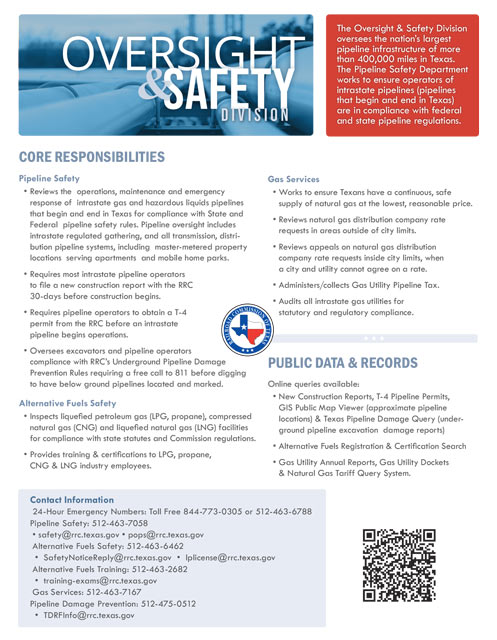Oversight & Safety Division
The Oversight and Safety Division has responsibility for Alternative Fuels, Gas Services and Pipeline Safety. This reorganization in January 2015 will bring even greater efficiency and consistency to these operations within the Commission, allowing the agency to better serve the state.
The Alternative Fuels Safety department enforces both the state law and Commission regulations on the safe transportation, storage, distribution and use of alternative fuels, which includes liquefied petroleum gas (LPG) (commonly referred to as propane); compressed natural gas (CNG) and liquefied natural gas (LNG). The department conducts safety evaluations of stationary facilities and mobile equipment, licensing companies engaged in alternative fuel activities, and provides training and licensing to individuals working in the alternative fuels industries. With staff operating from seven district offices throughout the state, Alternative Fuels Safety conducts approximately 14,000 inspections per year using a risk-based inspection schedule as well as specialized inspections. In addition, staff investigates safety related complaints and accidents involving alternative fuel mobile equipment and stationary facilities.
The Gas Services department’s responsibilities include establishing and ensuring just and reasonable natural gas utility rates that promote safe, efficient, reliable, cost-based, investor owned utility service to the citizens of Texas. The department’s Market Oversight section participates in contested rate determinations, reviews non-contested filings, collects and publishes natural gas utility tariffs, resolves consumer complaints and informal industry complaints, enforces the Commission’s requirements for utilities to file their gas curtailment plans, and administers a communication protocol during times of potential natural gas shortages. The department’s Utility Audit section administers the gas utility tax (both in-house and by field audit), audits natural gas utilities to ensure the proper computation and billing of authorized rates, and determines gas utility status. With field audit staff based out of three district offices, the Utility Audit section conducts approximately 140 audits each year. Audits are scheduled based upon an Audit Plan that prioritizes key areas such as computation and application of authorized rates as well as gas utility tax responsibilities. There are five types of specific focused audits: routine, special, cost of gas, quality of service and tariff audit.
The Pipeline Safety department ensures that the pipelines in Texas’ pipeline infrastructure (the largest in the nation) are designed, constructed, operated and maintained safely. The Commission is authorized by the Texas Utilities Code and Texas Natural Resources Code to regulate the safety of intrastate gas, hazardous liquid and CO2 pipelines in the state. The Commission is also certified by the U.S. Department of Transportation Pipeline and Hazardous Materials Safety Administration for the enforcement of federal pipeline safety regulations for intrastate pipeline facilities under the federal Pipeline Safety Act. In addition, the Pipeline Safety department enforces compliance by intrastate pipeline operators with federal and state laws and regulations and promotes public safety and awareness through the pipeline damage prevention program for Texas. With staff located in seven regional offices throughout the state, Pipeline Safety conducts approximately 2,850 inspections per year using a risk-based evaluation model as well as specialized inspections. Additionally, staff investigates accidents and complaints involving pipeline facilities.








